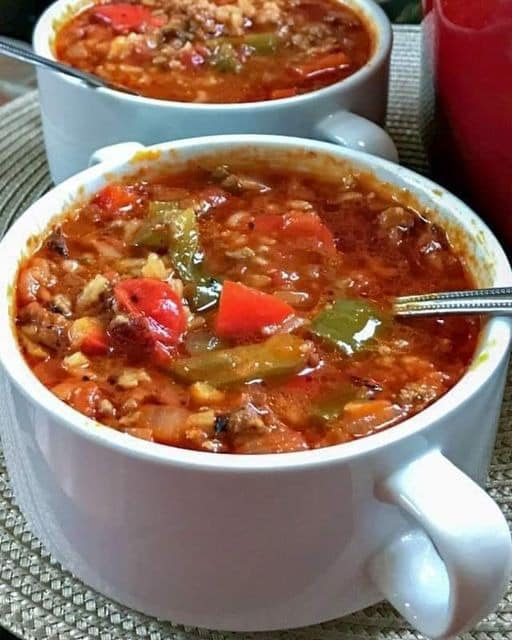
Grab Free Meal Plan From Here : /https://lowcarbkitchen.us/keto-diet-plan-for-beginners-step-by-step-guide-shanii/
Ingredients:
- 1 lb ground beef or turkey
- 1 tablespoon olive oil
- 1 onion, diced
- 2 bell peppers, diced
- 3 cloves garlic, minced
- 1 can (14 oz) diced tomatoes
- 1 can (14 oz) crushed tomatoes
- 4 cups beef or vegetable broth
- 1 teaspoon dried oregano
- 1 teaspoon dried basil
- 1/2 teaspoon dried thyme
- Salt and pepper to taste
- 1 cup cauliflower rice
- 1/4 cup tomato paste
- 1 tablespoon Worcestershire sauce
- 1 cup shredded cauliflower
- 1 cup shredded mozzarella cheese
- Fresh parsley, chopped (for garnish)
Instructions:
- Brown the Meat:
- In a large soup pot, brown the ground beef or turkey over medium-high heat. Drain excess fat if necessary.
- Sauté Vegetables:
- Add olive oil to the pot and sauté diced onions, bell peppers, and garlic until softened.
- Add Tomatoes:
- Add both diced and crushed tomatoes to the pot. Stir well.
- Season:
- Season the mixture with dried oregano, dried basil, dried thyme, salt, and pepper. Mix to combine.
- Pour in Broth:
- Pour in the beef or vegetable broth and bring the soup to a simmer.
- Add Cauliflower Rice:
- Stir in the cauliflower rice and continue to simmer until the cauliflower rice is tender.
- Incorporate Tomato Paste and Worcestershire Sauce:
- Mix in the tomato paste and Worcestershire sauce. Adjust the seasoning if needed.
- Simmer and Add Shredded Cauliflower:
- Let the soup simmer for another 10-15 minutes. Stir in the shredded cauliflower and cook until it’s just tender.
- Serve and Garnish:
- Ladle the soup into bowls. Top each serving with shredded mozzarella cheese and chopped fresh parsley.
- Enjoy:
- Allow the cheese to melt and serve the Keto Stuffed Pepper Soup hot. Enjoy!
This low-carb Stuffed Pepper Soup is a hearty and flavorful option for those following a keto lifestyle. It’s a comforting dish that captures the essence of stuffed peppers without the extra carbs. Adjust the ingredients and seasoning to suit your taste preferences.
What is healthy nutrition?
Nutrients are needed in the human body to perform daily functions. Food consumed creates the energy source required for physical activity and biological functions in the body. There are three basic nutrients in the foods we eat. These are carbohydrates, proteins and fats. In addition to these three basic groups called macronutrients, vitamins and minerals, which are micronutrients, are other components taken into the body with food. It is very important to fully meet the needs for vitamins and minerals for the smooth functioning of the digestive, respiratory, excretory, respiratory, circulatory, nervous, skeletal and muscular systems, the healthy production of hormones and body secretions, and the healthy maintenance of motor skills and cognitive functions. has some importance. In addition, maintaining the order of many systems in the body, especially the digestive system, is only possible by implementing a healthy and balanced nutrition plan. Healthy nutrition, in its most basic sense, is a type of nutrition that contains all macro and micronutrients in the amounts a person needs, also fully meets the amount of energy the individual needs, and is suitable for maintaining the ideal weight. Since each individual’s body composition, age, gender and health condition are different, there is no single list that can be defined as a healthy nutrition program. Although the general rules are clear, a healthy nutrition list should be prepared by a dietitian specifically for the individual.
Why is healthy nutrition important?
In order to maintain healthy body functions, protein, carbohydrates, fat, vitamins, minerals and dietary fibers must be taken into the body in sufficient amounts with food. For this, each type of food should be consumed in sufficient quantities and without excess, and diversity should be provided in the diet.
Proteins: Proteins are also called the constructive and restorative food group and are the most abundant nutrient in the structure of the human body. Protein needs must be fully met in order to support psychological and cognitive functions, to perform motor skills and produce the energy required for this, to maintain the healthy production of immune system elements and blood, and to perform many other functions. Protein, which is found in varying amounts in plant and animal foods, increases the amount of protein required for a healthy diet in young people and especially in physically active people and athletes with high levels of physical activity, while the amount of protein required to be taken with food decreases in individuals with a sedentary lifestyle and liver and kidney patients.
Carbohydrates: Carbohydrates are the body’s main energy sources; It is found mostly in grains, legumes and fruits. While individuals who want to eat healthy should take care to fully meet their carbohydrate needs, they should meet them from complex carbohydrates (whole grains, legumes, etc.) with high fiber, vitamin and mineral content, instead of refined sugar and purified grains. In this way, weight control can be achieved, while fluctuations in energy and mood can be prevented and blood sugar can be kept under control.
Fats: Fats, another nutrient, are among the food groups most associated with weight gain and should be consumed in moderation. However, in order to maintain body functions without any problems and especially to maintain hormonal balance, the amount of fat the body needs must be met from healthy sources. Processed oils such as animal fats and margarine should be avoided as much as possible, and instead, care should be taken to consume olive oil and fish containing omega 3 fatty acids. While meeting the fat requirement, this is not just about the fats added to foods; It should not be forgotten that foods such as meat, milk and fish contain significant amounts of fat.
Grab Free Meal Plan From Here : /https://lowcarbkitchen.us/keto-diet-plan-for-beginners-step-by-step-guide-shanii/

